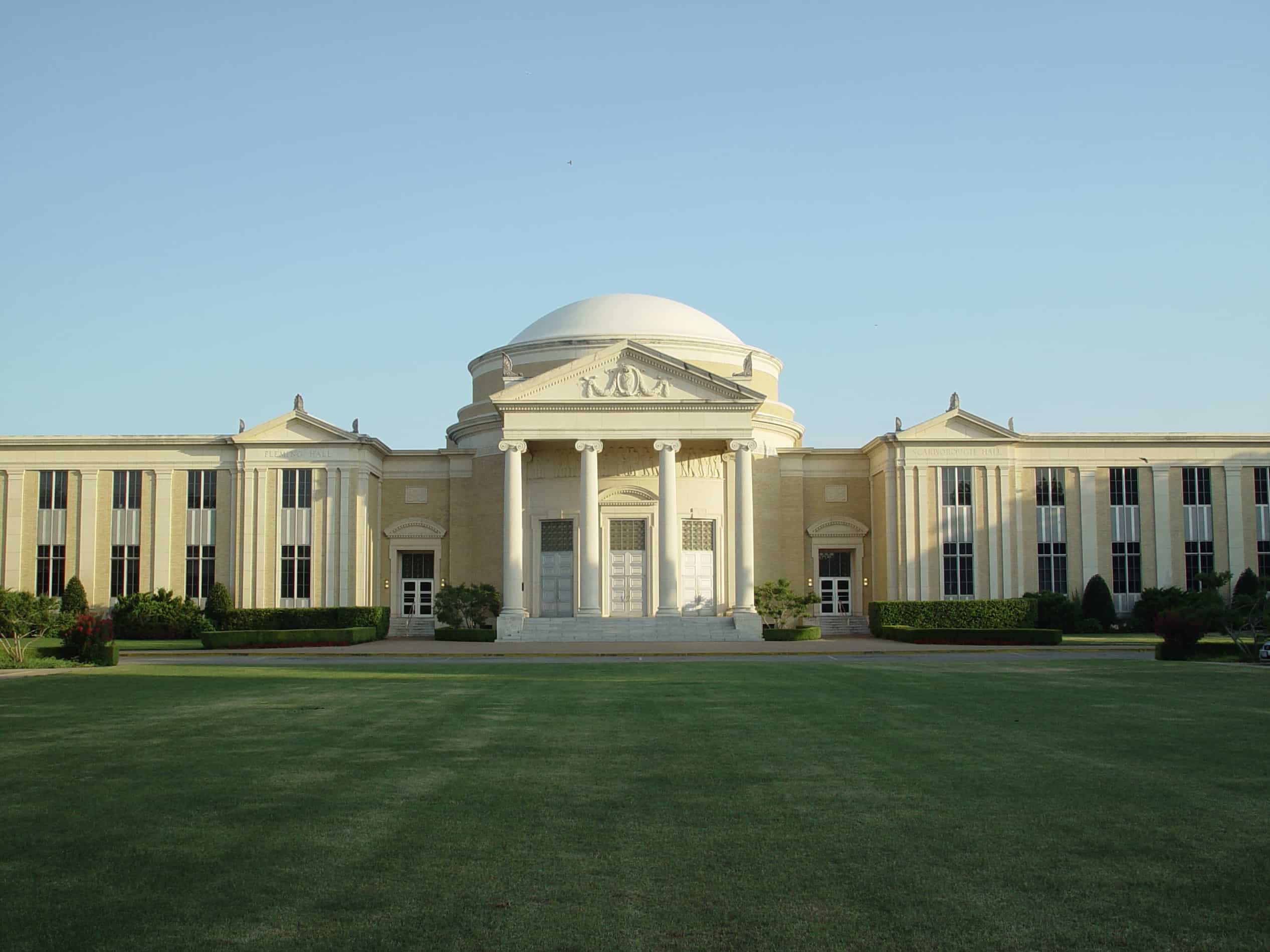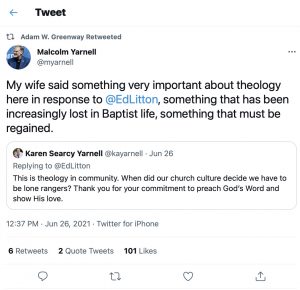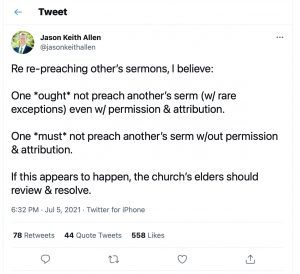Ed Litton, the newly elected president of the Southern Baptist Convention and pastor of Redemption Church in Saraland, Alabama, north of Mobile, has repeatedly plagiarized large blocks of material in his sermons, especially material from J. D. Greear. Ed’s been doing it for years, as well. Evidence has surfaced that even as early as 2015, pastor Litton was plagiarizing. He should immediately resign from the presidency of the Southern Baptist Convention.
Ed Litton should immediately resign from the presidency of the Southern Baptist Convention.
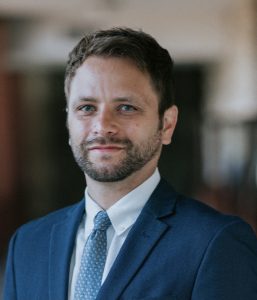
Owen Strachan, a former professor at Midwestern Baptist Theological Seminary and currently the provost and a professor at Grace Bible Theological Seminary in Conway, Arkansas, has strong words for plagiarists and those who don’t or won’t take a strong stand against intellectual theft. On Saturday, July 3, 2021, Dr. Strachan took to Facebook to say this:
I grieve the lack of clarity the sheep are getting over plagiarism. Let me give a few quick thoughts to try to help:
-
-
-
-
- Plagiarism is stealing.
- At GBTS, the seminary I serve, plagiarism will jeopardize your standing as a student and likely result in expulsion.
- If a pastor plagiarizes even once, in normal circumstances he should lose his job.
-
-
-
My comments on plagiarism of late are theological, not political. Plagiarism is a huge character issue. It is usually linked with other sins. As a professor who’s dealt with it multiple times, I know this firsthand. I have also seen this play out in churches, and have tragic experience there.
Plagiarism is a grave moral failing that rightly shuts down careers—especially pastoral careers, because we who teach Scripture are held to the highest standard on planet earth (see James 3:1). It must be so, and in any sound church and institution, it will be so.
Forgiveness is always available in Christ, and praise God for this. Every Christian needs divine forgiveness daily! But forgiveness does not nullify accountability. The preaching and teaching office is to be held only by godly men of consistent character. These men are not perfect by any stretch, but they are not to engage in isolated behavior or patterns of sin in any form that shame the church. If they do, they are to be expelled from the ministry.
If we politicize moral matters, making them not about actions but about warring parties, we place our church and institution on sand, not solid rock. It is true that there are diplomatic matters to handle in Christian circles. But we must handle moral matters morally, lest we lose our spiritual birthright. This applies not to one group or church or denomination, but all of us who claim the name of Christ.
Previously, on June 28, Dr. Strachan had posted this.
I am seeing folks say on social media that pulpit plagiarism is less serious than academic plagiarism.
Words fail me here. Is this a joke? Biblically, a pastor is held to a VASTLY higher standard than a student. Pastors are to be models of godliness. Consider this verse alone: “Not many of you should become teachers, my brothers, for you know that we who teach will be judged with greater strictness” (James 3:1).
Honestly, I feel like the kid in the famous YouTube video: is this real life? Are we actually arguing that pastoral borrowing and stealing (wherever the lines are exactly) is not a big deal? If so, we are a post-moral people.
God’s hand is heavy upon us in these days. What is going on?
Two of the Six Southern Baptist Seminary Presidents Are Implicitly or Explicitly Supportive of Ed Litton
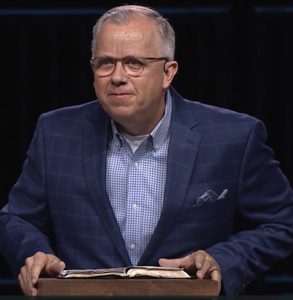
The answer to the question of what Ed Litton should do should be a no-brainer! Yet two seminary presidents have offered him overt or implied support. Danny Akin, president of Southeastern Baptist Theological Seminary in Wake Forest, North Carolina, tweeted the following after Ed Litton issued a statement in the wake of the controversy. Greear released his own statement about the matter as well. I believe both pastors’ statements be weak and inadequate, especially since a pattern of plagiarism on the part of pastor Litton has emerged. My point here, however, is Danny Akin’s response.
Thank you my friend. I appreciate your humility, transparency and integrity. Grateful for you! https://t.co/xHkqc4FYMH
— Daniel Akin (@DannyAkin) June 26, 2021
Kenneth Keathley is a professor of theology at SEBTS. He tweeted, “Full disclosure: the preachers who mentored me considered plagiarizing a sermon to be an impossibility. Like Augustine, they believed that “the Word of God belongs to all who obey it.” In other words, if a sermon truly is based on Scripture then no one owns it but God.” Then he offered a lesson from history about how using the material of others had been treated in the past.
To be clear, I’m not saying they were right. But we need to be aware that many in earlier generations thought very differently about the issue than we do today.
— Kenneth Keathley (@ken_keathley) July 2, 2021
So, Dr. Keathley isn’t “saying they were right,” but he’s not saying they were wrong, or that Ed Litton was wrong, either.
Meanwhile we see this from leaders at Southwestern Baptist Theological Seminary in Fort Worth, Texas. Malcolm Yarnell is a professor of theology at SWBTS.
His wife had tweeted, “This is theology in community. When did our church culture decide we have to be lone rangers? Thank you for your commitment to preach God’s Word and show His love.”
Yarnell responded, “My wife said something very important about theology here in response to @EdLitton, something that has been increasingly lost in Baptist life, something that must be regained.”
My wife said something very important about theology here in response to @EdLitton, something that has been increasingly lost in Baptist life, something that must be regained. https://t.co/WSFHBMQxe7
— Malcolm Yarnell (@MusingsOnChrist) June 26, 2021
What?!? Theology in community? This reminds me of Exodus 32:24 (context Ex. 32:19-24). Aaron told Moses, “And I said to them, ‘Whoever has any gold, let them break it off.’ So they gave it to me, and I cast it into the fire, and this calf came out.”
Glenn Melvin describes himself this way on Twitter: “Film/TV Producer. OEF Veteran. Army Reservist. Husker. Jesus Freak.” Melvin pushed back against Malcolm Yarnell and his tweet: “So there won’t be any section about plagiarism on the syllabus this semester? The President of the SBC should be held to higher standard than seminary students. And this coming from the only professor who claims his materials for class are subject to copyright.”
So there won't be any section about plagiarism on the syllabus this semester? The President of the SBC should be held to higher standard than seminary students. And this coming from the only professor who claims his materials for class are subject to copyright.
— Glenn Melvin (@glennmelvin) June 26, 2021
Significantly, Dr. Adam Greenway, president of SWBTS, retweeted the above item from Dr. Yarnell and his wife, giving tacit approval to Ed Litton’s plagiarism.
The Silent Ones
The remaining four seminary presidents,
-
-
- Jeff Iorg of Gateway Seminary,
- Jason K. Allen of Midwestern Baptist Theological Seminary,
- Jamie Dew of New Orleans Baptist Theological Seminary, and
- Albert Mohler of Southern Baptist Theological Seminary,
-
have not made recent statements.* However, in 2006, Dr. Mohler did publicly condemn plagiarism as stealing.
The silence is deafening. The excuses offered for Litton’s behavior are egregious. The implicit support given to him is unconscionable. Unless they repent of their silence or of offering excuses for the SBC president’s having engaged in willful and repeated theft, the seminary presidents are complicit in widespread corruption in the Southern Baptist Convention. The same can be said about professors who have supported Litton, although the presidents are especially culpable.
Dr Gagnon Weighs In
Dr. Robert A. J. Gagnon, theologian and professor at Houston Baptist University, addressed the situation with a statement that was just as strong as Owen Strachan’s.
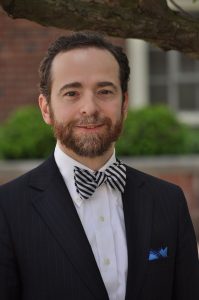
Fifteen years ago Albert Mohler called pulpit plagiarism a “despicable” act of “stealing.” D. A. Carson declared eleven years ago: “Taking over another sermon and preaching it as if it were yours is always and unequivocally wrong, and if you do it you should resign or be fired immediately.” Nine years ago even J. D. Greear thought pulpit plagiarism was wrong; but now that it has been committed to an egregious extent by his friend and SBC President successor Ed Litton it is apparently, like homosexual practice, not something to “shout” about.…
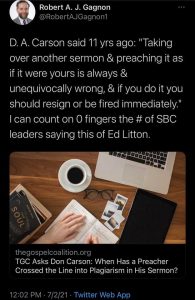 Where are the courageous SBC leaders who will stand up now? Will there be no repercussions for the extensive serial plagiarism by SBC President Litton, which involved not just of one of previous SBC President Greear’s messages but of dozens? And, worst of all, plagiarism of Greear’s doctrinal errors concerning the Bible’s stance on sexual ethics in general and homosexual practice in particular. The fact that Litton got permission from Greear to use his material (so the story goes) is irrelevant to the fact that he passed the material off to his congregation as his own work. As I said, the plagiarism was not just a line here or there. It was (1) extensive transfer of sermons and (2) a serial sin. What are the repercussions?
Where are the courageous SBC leaders who will stand up now? Will there be no repercussions for the extensive serial plagiarism by SBC President Litton, which involved not just of one of previous SBC President Greear’s messages but of dozens? And, worst of all, plagiarism of Greear’s doctrinal errors concerning the Bible’s stance on sexual ethics in general and homosexual practice in particular. The fact that Litton got permission from Greear to use his material (so the story goes) is irrelevant to the fact that he passed the material off to his congregation as his own work. As I said, the plagiarism was not just a line here or there. It was (1) extensive transfer of sermons and (2) a serial sin. What are the repercussions?
Where are the courageous SBC leaders who will stand up now?
—Dr. Robert A. J. Gagnon—
Former SBTS seminary professor Russell Fuller has also weighed in concerning this controversy. He has joined a growing number of Southern Baptists who are calling on Ed Litton to resign.1
There ought to be serious repercussions for the seminary presidents as well as for Litton.
Seminary Policies Against Plagiarism
The seminary presidents have a lot of explaining to do. How is it that they can support Ed Litton or remain silent in the face of mounting evidence that he is guilty of habitual plagiarism, even as the educational institutions they lead have strong policies against the practice? The presidents need to answer to the trustees of the institutions they lead and to rank and file Southern Baptists. If the trustees don’t demand answers, Southern Baptists should replace them.
I’m waiting for our leaders to speak up and address this issue!
*Note: On July 5, Midwestern Baptist Theological Seminary president Jason Allen tweeted,
Re re-preaching other’s sermons, I believe:
One *ought* not preach another’s serm (w/ rare exceptions) even w/ permission & attribution.
One *must* not preach another’s serm w/out permission & attribution.
If this appears to happen, the church’s elders should review & resolve.
Copyright © 2021 by B. Nathaniel Sullivan. All rights reserved.
Seminary Policies Against Plagiarism
The following information on each seminary’s policy against plagiarism is representative but not exhaustive.
Gateway Seminary Student Handbook, San Francisco Campus
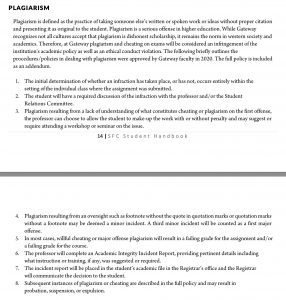

MBTS Information on Academic Integrity
It cannot be exaggerated how strongly Midwestern deplores plagiarism in all its forms. Dishonesty is incompatible with the very purpose for which a student avails himself of its ministries. It is to be desired that one remain without a degree rather than to obtain it by dishonest means, for Christianity cannot countenance conduct that contradicts its basic tenets. It is further to be hoped that each individual will recognize a responsibility for his brother as well as for himself in all such matters.
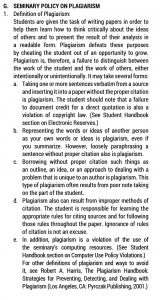
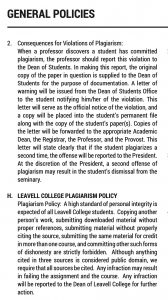
SEBTS Academic Policies for All Students
ACADEMIC INTEGRITY/POLICY ON PLAGIARISM
ACADEMIC INTEGRITY
Students often have class assignments that involve academic research. In preparing their papers and other assignments, students must not copy the work of others. Any direct quotations must be documented. Summaries and paraphrased materials must also be noted with reference in the text or notes to the original sources. Students should document their sources and maintain the highest standards of academic integrity in all of their work. Plagiarism, cheating on tests, and other forms of academic fraud will not be tolerated. Students who engage in such activity will receive a failing grade on any fraudulent work and may receive a failing grade for the course. All instances of such behavior will be recorded on an offending student’s record with the Registrar and Deans. In addition, the Dean of Students reserves the right to take disciplinary action against those guilty of such behavior.
SOUTHEASTERN POLICY ON PLAGIARISM
Students in attendance at Southeastern are expected to maintain high standards of academic integrity appropriate to a Christian lifestyle. Plagiarism and cheating in any form will not be tolerated.
Integrity requires that the Christian student conduct himself or herself according to the highest academic standards. Plagiarism is a very serious offense because it is stealing. Not only does plagiarism steal from the original author, but it also takes away from the student the opportunity to learn and grow in the way the assignment was intended to provide.
WHAT IS PLAGIARISM?
Joseph Ribald defines plagiarism in this way: “Derived from the Latin word plagiaries (‘kidnapper’), plagiarism refers to a form of cheating that has been defined as ‘the false assumption of authorship: the wrongful act of taking the product of another person’s mind, and presenting it as one’s own’ ” (MLA Handbook, 6th ed. [New York: Modern Language Association, 2003], 66, quoting Alexander Lindey, Plagiarism and Originality [New York: Harper, 1952], 2). Plagiarism can be committed in a number of ways, four of which are highlighted here:
-
-
- Quoting one or more sentences verbatim without proper citation. This is the most obvious form of plagiarism. In addition, using unattributed direct quotations is a violation of US copyright law. Electronically cutting and pasting is easy to do, so it presents a definite temptation-especially if a deadline for an assignment is looming.
- Presenting the thoughts or ideas of another without proper attribution. Many students fail to realize that this practice is also plagiarism even if a student writes the summary himself. If one paraphrases the work of another, then he must give a proper citation.
- Borrowing without proper citation such things as an outline, an idea, or an approach to dealing with a problem that is unique to an author. This type of plagiarism often results from poor note-taking on the part of the student.
- Using improper methods of citation. The student is responsible for learning the appropriate rules for citing sources and for following those rules throughout the paper. Ignorance of the rules of citation is not an excuse.
-
For other definitions of plagiarism and ways to avoid it see Robert A. Harris, The Plagiarism Handbook: Strategies for Preventing, Detecting, and Dealing with Plagiarism (Los Angeles, CA: Pyrczak Publishing, 2001.) If there is a question as to whether a citation is necessary at a particular point, it is a good rule of thumb to include it. Very few papers are penalized for over-citing! In addition, help is available from professors, the Writing Center, and the Library regarding how to work with sources.
WHAT IS THE PENALTY FOR PLAGIARISM?
The penalty for plagiarism in a particular course is determined by the professor and generally will range from a failing grade for the assignment to a failing grade for the class. However, all instances of plagiarism are reported to the Dean of Students, along with a copy of the documents in question. The Dean of Students will take disciplinary action on behalf of the school, and the minimal action taken will be disciplinary probation. Disciplinary probation is defined in the Student Handbook as “notice to the violating student that if the inappropriate behavior is repeated, suspension or expulsion is likely.” The infraction will also be recorded in the student’s permanent file. A copy of the disciplinary letter will be sent to the student, the professor, the Registrar, the Dean of the College (in the case of an undergraduate student), and the Provost/Dean of the Faculty.
The disciplinary letter will clearly state that in the event of a second offense the Dean of Students will report the matter directly to the Dean of the Faculty and the result can be expulsion from school.
SBTS Information on Student Conduct
Student Conduct
Plagiarism & Telecommunications
Plagiarism is the use or theft of intellectual property without attribution, both a moral and educational transgression. Students are required to affirm academic integrity in writing when submitting all course work: On my honor, I have neither given nor taken improper assistance in completing this assignment. (See Appendix.) Appropriate and ethical behavior honors the software licensing agreements and copyright law; respects confidentiality and/or privacy of data; uses telecommunication and computing resources without offending, annoying or harassing others. Students and employees are accountable for their use of all computing and telecommunications resources. Misuse may result in legal or disciplinary action.
General Information
3. The institution may take disciplinary action should any ethical standard of an academic and/or personal nature be violated. In the case of academic dishonesty (see item 2 above) breaches of this standard will result in the failure of the assignment along with further possible disciplinary measures as outlined below. All cases of plagiarism will be reported to the Dean of Students and will be kept on file. The institution recognizes a professor’s authority to undertake disciplinary actions concerning any of his students in the context of his classroom. Generally, violations of the institution’s ethical conduct policy include, but are not limited to:
-
-
- Academic dishonesty, including cheating, submitting without approval work originally prepared by the student for another course, and plagiarism, which is essentially submitting as one’s own work material prepared in whole or in part by another person while failing to give proper credit on papers for sources used.…
-
Disciplinary Action and Appeals Process
Function of Disciplinary Sanction
Disciplinary sanction is administered through the office of the Dean of Students, who is charged with the investigation of inappropriate behavior. All disciplinary sanctions are designed as redemptive measures for personal growth and professional development, with primary concern for the welfare of the seminary Community. Disciplinary action may result from any inappropriate behavior, such as immoral or unethical conduct, menacing or disruptive activity, violations of personal and/or property rights, civil or legal infractions, etc. Examples include:
-
-
- Academic misconduct, such as plagiarism or cheating
- False witness, deception or alteration of records
- Neglect of financial obligations, economic malfeasance, or gambling
- Theft or destruction of public, private or personal property
- Use or possession of illegal drugs or intoxicants such as marijuana
- Use of alcoholic beverages
- Homosexual behavior or heterosexual misconduct
- Repeated violation of a seminary regulation
- Conduct unbecoming a Christian minister
-
~~~~~~~~~~~~~~~~~~~~~~~~~~~~~~~~
top image: B. H. Carroll Memorial Building at Southwestern Baptist Theological Seminary
Unless otherwise indicated, Scripture has been taken from the New King James Version®. Copyright © 1982 by Thomas Nelson, Inc. Used by permission. All rights reserved.
Note:
1Dr. Fuller wrote on Facebook,
Ed Litton should resign as president of the SBC and as pastor of his local church.
Litton preaches/teaches heresies (partialism, for just one example) and plagiarizes his sermons, many of which contain more heresies. Furthermore, he is unrepentant, claiming that he has permission to plagiarize, even to the extent of telling stories in the first person as if they were his personal experiences. (The pastor who gave him permission, JD Greear, should also resign his church as well, if in fact, he did give permission). This is fraud.
Such deceit reproaches the church and the SBC. The leaders of the SBC reproach themselves by defending Litton or remaining silent concerning Litton. The leaders of the SBC cannot call out Litton’s clear example of heresy and dishonesty because their own school or agency teaches heresies and manifest corruptions. They cannot even call out the obvious lie of the false briefs that NAMB and the ERLC filed in Federal court and even in the Supreme Court.
Ed Litton should resign. And so should every agency head and trustee in the SBC.
Please consider signing this statement to remove Litton as president of the SBC.
https://www.facebook.com/russell.fuller.982/posts/10227141535588609
